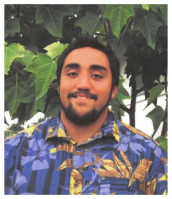Successful Essays From The Past
- Brook Agsalda
Essay April 2023
What are the most pressing issues facing working people in Hawaii and how can organized labor in general and ILWU 142 in particular help to address these issues?
Born and raised in beautiful Hawaii as a 3rd generation grandchild of an immigrant plantation worker I consider myself lucky! My grandpa Primo Agsalda was born in a northern town of Vintar, Philippines and didn’t have the same opportunities as me. Growing up his family did not have much money. In fact, he only completed schooling up to the 6th grade because he had to work in the rice fields with his family in order to earn a living. Like many others, my grandpa came to Hawaii after marrying my grandma with hopes that he and his family would have a better life. He would gain his citizenship in 1979 which is when he found a job at the Waialua Sugar Company and became a part of the union known as the ILWU.. Being a part of the ILWU provided him with protection as a worker and an opportunity to provide for generations to come.
With that being said, it is an unfortunate reality that not everybody has a union fighting in their favor without twisted intentions. Even to this day, the ILWU continues to fight for local workers and unions as a whole need to fight towards a common goal to improve conditions. Every local should have equal opportunity and be able to afford living on the islands. While there are many contributors to this problem, there are possible actions that the ILWU can take to try alleviating them.
Evidently, a big issue that locals are facing in Hawaii is being priced out of paradise due to the high cost of living. The average cost of living in Hawaii is $2,457.72 per month. The problem is that prices are rising but minimum wage remains almost exactly the same at $12 an hour. Most people have to maintain more than one job to make up for the lack of financial means to survive in this economy. Working nine to five and still not making enough money to get by without an additional job or two is ridiculous. The price of housing, groceries, etc. continues to go up, but our workers wages stay the same. This is why it is incredibly important that unions continue to fight for better, livable wages. Going into the teaching profession myself, I hope that unions like the ILWU will continue to fight to make compensation for teachers more equal to the amount of work put in. I would like to raise my own kids in Hawaii and have them experience the unique culture that I feel only living here can provide. Still, I can only accomplish this if wages are changed to match inflation.
Moreover, another prevalent issue Hawaii is facing is homelessness. While the problem was always present, the pandemic only escalated it. COVID-19 resulted in people all across Hawaii being laid off, and some have not been able to return to work since then. With a rush to the unemployment office, checks were backed up leaving some unable to provide for some basic needs, much less rent or a mortgage. I witnessed unemployment first hand when my mom got laid off in 2020. It was a very stressful time for my parents because they had to make sure that they could still provide for myself and my siblings. Since January 2023 the unemployment rate is 24.6%. There is always talk about gaps in employment and a high need for workers, yet the unemployment rate is disproportionately high. It’s up to unions and employers to fight for and value their workers. Everyone is replaceable in today's corporate workforce, but people may not have a replacement income after being laid off.
Additionally, tourism is no doubt the driving force behind Hawaii's economy. However, we need to find other industries to rely on besides tourism. As we learned from Covid, reliance on tourists from other states and countries coming here is fallible. Around 85-90% of our food is imported meaning that we can not sustain ourselves. Something for Hawaii to consider as a whole is trying to become more self-sustainable. Growing our own food will create a wide variety of new job opportunities and also help restore the land. In fact my grandpa since retiring has been farming land in Waialua. He grows fruits and vegetables and supplies farmer’s markets with fresh produce. We need more people like him to support our local food industries.
Furthermore, the ILWU can help by continuing to fight for better wages and working conditions so that their workers can continue to provide for their families and come home safely. Without the ILWU my grandpa may not have had the life he has today. My mom is a part of the Unite Here: Local 5 and my dad is a part of the HSTA: Hawaii State Teachers Association. With both of my parents being union workers, this essay really helped me understand the importance of unions and the role that they play in society. On a side note my dad was a recipient of this scholarship in 1995 when he attended school at the University of Hawaii at Manoa. He shared to me the value of how it helped my grandpa fund his college education.
In conclusion, some problems that our working people of Hawaii face are low wages, unemployment, and limited job opportunities. Our priority should be taking care of our workers and coming up with solutions to these problems. So much of the working class suffers from these problems that practically everyone has seen or experienced it themselves. We need to work together to get rid of these problems in Hawaii and speak for those who can’t. We need to take care of each other and look after each other. No matter what you do, everyone deserves equal opportunities. - Maikalewa Koka
April 1st, 2023 Harriet Bouslog Labor Scholorship ILWU Local 142
Pressing Issues Facing Working People in Hawaiʻi
Hawaiʻi is renowned for its exquisite beaches, breathtaking landscapes, and gracious people. However, what is often not recognized is that the hardworking people of Hawaiʻi, who are known for their hospitality, face a multitude of pressing issues that impact their daily lives. In this essay, I will discuss some of the issues that the working class of Hawaiʻi face which include the high cost of living, low wages and state minimums, and job insecruity. I will also focus on how organized labor, particularly the ILWU 142, who are one of the most prominent unions in Hawaiʻi with a long history of advocating for workers' rights, can help address these issues.
There are several issues that impact the working class citizen in Hawaiʻi, but the most significant issue in Hawaiʻi is the high cost of living. According to the Council for Community and Economic Research, Honolulu is the fifth most expensive urban area in the United States. The ILWU 142 can help address this issue by continuing negotiations for better wages and benefits for its members. The ILWU 142 has a proven track record of reaching successful collective bargaining agreements for its union members to aid in providing stability and lessing the hardships of making ends meet.
Low wages is a huge issue facing workers in Hawaiʻi, as many find it difficult to acquire the basic necessities of survival with the current minimum wage of $10.10 per hour. With variables that high costs of living bring with a minimum wage that does not correlate, many working class citizens have had to make the hard decision to leave Hawaiʻi. The International Longshore and Warehouse Union (ILWU) Local 142 can play an important role in addressing this issue by negotiating better wages for its members. As mentioned previously, the union has a history of advocating for better wages and working conditions for its members and has been successful in negotiating higher wages for workers in the past. By advocating for better wages, the union can help workers to meet their basic needs, and keep the local people and their ʻohanas here in Hawaiʻi.
In addition to negotiating better wages for its members, the ILWU 142 can also advocate for a higher minimum wage statewide. A higher minimum wage would not only benefit workers but would also stimulate the economy by increasing consumer spending. When workers have more money to spend, they are more likely to purchase goods and services, which helps to boost the economy. Advocating for a higher minimum wage is not an easy task, and the ILWU 142 would need to work with other labor organizations and community groups to gain traction and build a following of support that can not be denied by the government.
Building a support group of a larger size is very possible for the ILWU 142 because they have an extensive amount of networks and resources to mobilize workers and community members to support a higher minimum wage. The International Longshore and Warehouse Union Local 142 represents a diverse group of workers in Hawaiʻi, including those in the longshore, warehouse, and clerical industries. Specifically, the union represents workers employed in various ports and terminals throughout the state, including the ports of Honolulu, Hilo, and Kahului. The union also represents workers employed in the transportation and distribution industries, as well as those in the hospitality and tourism industries.
Job insecurity is another pressing issue facing working people in Hawaiʻi. Many workers are employed in low-paying jobs with no job security, which makes it difficult for them to plan for their future. The ILWU 142 can address this issue by negotiating for job security provisions in their contracts. These provisions could include protections against arbitrary firings and layoffs, as well as a fair grievance process for workers who have been wrongfully terminated. The ILWU 142 can also provide its members with training and support to help them advance in their careers and secure long-term job opportunities. This may include offering training programs and career counseling and job placement services.
The people of Hawaiʻi are known for their hard work, resilience, and hospitality, but they face several challenges that go unrecognized. High living costs, low wages, and job insecurity are among the pressing issues impacting the working class. However, there is hope. The International Longshore and Warehouse Union Local 142 has a history of advocating for workers' rights and can play a crucial role in addressing these issues. By negotiating better wages, job security, and a higher minimum wage statewide, the ILWU 142 can help improve the lives of its members and keep the local people and their ʻohana in Hawaiʻi.
- Maria Andrade
March 30, 2023
The Future of a Technological Job Market
Do you have a family member who lost their job because of new machines and technology in the workplace? As time goes on, companies will continue to upgrade their businesses with new technologies that could make stores efficient and quicker. New machines are not necessarily a terrible implement, but they can lead to many employees being laid off or receiving pay cuts because of these new investments. This is a good time for unions and organized labor in Hawai’i to step in. Employees need to matter more than new machines, and by working together, unions and employers can come to an agreement to help transition workers through these adjustments of new technologies. A few methods that the organized labor union in Hawai’i can deal with the loss of jobs due to new technology is by providing retraining, adjusting collective bargaining, and ensuring workers feel valued in the workplace.
One of the first aspects the union should assist is with the retraining of employees to work alongside machines. This can ensure that they maintain the ability to support themselves and their families without enduring unemployment. Organized labor needs to work alongside employers to help employees adapt to working with new machines. Unionized workers have a right to a Union Steward or other representatives to help with problems that arise because of new machines. This is especially important for older (senior) employees that may have a difficult time learning how to use new systems and software in contrast to young adults. It can ensure that employees are less likely to be laid off or forced into early retirement because they don’t possess the skills for a transitioning workplace. Retraining and reskilling can also make sure workplaces are secure for employees that need to work alongside these new technologies and that work can be done more safely. Unions need to ensure the learning of these new skills so that wages will also stay fair and that workers will have to qualifications to keep their job.
In addition, another way the labor union can work to implement these new retraining programs is to add new collective bargaining contracts. Employers need to be held accountable for their workers to help employees keep their jobs. The way the union could do this is by including new details and stipulations in their contracts such as free retraining and seniority over new jobs coming in so that employees can keep their jobs. Free retraining will allow employees to be able to afford to keep their jobs and continue to support themselves. Also, allowing long-time employees seniority over new jobs being created because of new technology will make it less likely that the company will bring someone over from the mainland who could take jobs from locals. An example of this is the Culinary Workers Union Local 226 in Las Vegas, which was able to debate with the company and create new and fair contracts for the employees which included; six months' notice of the new appliances and machines that could lead to layoffs and the reduction of wages, free reskilling training, and access to free job training if any new jobs are created because of the new automatons (Green, 2019). These are just a few ideas of changes that could be made to contracts here in Hawai’i that will help employees have a better safety of mind when they are notified about any new changes at their jobs whereas nonunion workers may be concerned about new technology replacing their jobs. The labor union could also start a fund for employees that are in this position. As a union, electing stewards and officers that are educated about the issue of new technology in the workplace can help make the union stronger. By either raising or using dues the union has already collected, a fund can be created to help workers pay for any occupation retraining that is necessary to fulfill their responsibilities. Especially since this is a new reality that is only going to become more common throughout the years.
Furthermore, adding new collective bargaining agreements will help employees who are being unfairly treated because they are being unreasonably appraised against new technologies in the workplace. While it is a good investment that new technologies can make businesses more efficient, this should not be to the detriment of regular employees. Many employees are being let go because they are being evaluated alongside–what is essentially–robots. New technologies do not need breaks or days off like employees, so they should not be held to the same standards. This is resulting in unnecessary stress and worry for workers, and can prompt them to be overworked due to the fear of losing their jobs. Unions need to help workers feel valued and well cared for in the workplace because of the introduction of new technologies. For instance, if you are given a warning by management, a union representative needs to be contacted immediately especially if the employee is being disciplined for an unfair reason. The ILWU union in particular provides a Guide for New Members that reminds employees that a union representative must be present during the meeting to make sure the employee is being disciplined for a genuine reason (Guide for, 2019). Organized labor unions can help employees feel appreciated because they know the union will negotiate to protect their livelihood and wages. In addition, unfair layoffs and lower wages can cause employees to go on strike, which is also a course of action the labor union in Hawai’i can support by using their respective strike funds if there is one available. While this is something that may be used as a last resort, it will help employers understand essential workers that should not be replaced by new machinery.
Overall, it can be said that organized labor and unions in Hawai’i have many different tools and resources that can be used to deal with the loss of jobs as a result of new technology. Altogether, the new technology does not have to be adversity for employees, and providing retraining, adjusting collective bargaining contracts, and ensuring workers do not feel undervalued are a few strategies that can be used to assist workers during the addition of new technologies in the workplace. The organized labor in Hawai’i has a responsibility to make sure people are well cared for and can be successful with these new changes especially by seeing the success of other unions in different states going through these same issues. Employees need to stand up for their rights and know if they are represented by a union. Employees in Hawai'i should not have to go through these changes alone.
Resources (2019, February) Guide for New Members – ILWU Local 142. (n.d.). ILWU Local 142.
https://ilwulocal142.org/blog/members/guide-for-new-members-test/
Cite
Green, K. (2019, September 17). How Unions Can Protect the Workers Vulnerable to Automation. UnionTrack® ENGAGE.https://uniontrack.com/blog/unions-and-automation
 COLLEEN M. GARRETT
COLLEEN M. GARRETT
Kapolei High School
University of Hawai`i, Manoa
“What was the most important accomplishment of ILWU Local 142 in Hawaii?”
Upon learning the extensive and deeply rich history of ILWU Local 142, the most significant accomplishment in my eyes is truly the multitude of ways in which the union came to shape labor rights and conditions for all citizens of Hawaii, not merely those who were paying members. One such event in ILWU Local 142 history that remains an important accomplishment to this day, is the May 1, 1949 Dock Strike, which lasted a total of 177 days in efforts to officially challenge the longstanding colonial wages here in Hawaii.
These colonial wages forced Hawaii longshore workers into receiving disproportionately lower pay than longshore workers of the same time period located along the West Coast of the United States. ILWU Local 142 members set forth to close this wage gap by seeking a pay increase from $1.40/hour, to match the $1.82/hour which was being paid to workers of the same trade in the West Coast region. KOLTON E. PUGAY
KOLTON E. PUGAY
Damien Memorial School
University of Hawai`i, Manoa
“What was the most important accomplishment of ILWU Local 142 in Hawaii?”
Learning about the ILWU Local 142 was very interesting and served a huge purpose for the workers of Hawaii. Before ILWU Local 142, the Territory of Hawaii consisted of five big companies known as the “Big Five.”
These companies took majority of the land and job systems in Hawaii. Ruining the economy in Hawaii, the “Big Five” would have its workers live in company housing and work the plantations. Workers would face long, harsh hours as well as very low wages and poor working conditions. This group dominated the territorial government of Hawaii and its economic, political, and cultural life. Though there were many protests by the workers, employers had no sympathy and allowed this to continue.
Finally, ILWU Local 142 was created which gave workers of Hawaii hope for a better future.The union gave workers an opportunity to earn better wages, work reasonable hours, and get benefits that will help them in life. IWLU Local 142 also gave workers a safer environment to work inwhere they would not have to worry about unsanitary conditions or dangerous environments while working. It provided employers who actually cared for their employees and their families.Employees of the union were finally able to work for jobs that would keep them economically stable and allow them to provide for they families. RAYMOND G. ANDRADE
RAYMOND G. ANDRADE
Baldwin High School
University of Hawai`i, Manoa
“The ILWU Local 142 Leading Hawaii’s Working Future”
The International Longshore and Warehouse Union, better known as ILWU Local 142, was a union formed to protect the rights and improve the working conditions of laborers in Hawaii. Today, the ILWU Local 142 includes approximately 18,000 workers from numerous industries such as longshore, general trades, tourism, and agriculture. The ILWU Local 142 has had a massive impact on the lives of many in Hawaii, however, the most important accomplishment of all, would be the creation of the union itself.
Before the establishment of labor unions such as the ILWU Local 142, there were five major companies monopolizing the sugar industry known as “The Big Five”. These sugar companies brought laborers from various countries and ethnicities to work for them in promise of better living conditions. The sugar industry in Hawaii was a significant source of income for the island and all of its residents. Due to the massive size and power of these companies, they were able to greatly influence the decision of politicians, they were able to greatly influence the decision of politicians and movement of the government. Among political influence, were laws and bills created to limit the rights of workers and ability to refute the conditions set forth by their employers. CELINA J. HAYASHI
CELINA J. HAYASHI
King Kekaulike High School
University of Hawai`i, Manoa
“Harriet Bouslog Labor Scholarship Fund”
The paramount accomplishment of ILWU Local 142 in Hawai’i was that they were relentless in their pursuit of providing justice to hard-working and humble people like my grandfather.
Many of these plantation workers were immigrants with incredible work ethic and admirable dreams, striving to provide for their families. Additionally, many of them had very little education and had no means of advocating for themselves. Without the organization and empowerment of ILWU Local 142, these employees could have easily been exploited in plantations for the entirety of their careers.
At the time of my grandfather’s employment, Hawaii’s economy was dominated by just a handful of landholding companies. The plantation system implemented by these companies forced workers, like my grandfather, to live in undesirable company housing and work the plantations for meager wages doing backbreaking physical labor. XANDRIA M.L.Y. AKAU
XANDRIA M.L.Y. AKAU
Kamehameha Schools Keaau Campus
Hawai’i Community College
“An Injury To One Is An Injury To All”
ILWU Local 142 is in place essentially to help employees, and always be there for them when they need support. In my opinion, the most important accomplishment of the ILWU Local 142 in Hawaii is that by exemplifying solidarity by working towards a benefit all those involved.
I believe that unions help us because they focus on the best interest and the protection of the workers, which is really important. It is essential for workers to be protected with job security because most working adults have families, and they don’t want to have to feel uneasy about losing their job or getting a pay cut for no justified reason. KAPENA K. AVEIRO
KAPENA K. AVEIRO
Kamehameha Schools Keaau Campus
University of Hawai’i, Hilo
“To Start A New Beginning”
Jack Hall was the start of change of Hawaii’s work force. And because of his actions it still impacts people every day. He left a great legacy of the ILWU Local 142, and I am sure it will still positively affect many in the future. ILWULocal142 created the opportunity for a sense of dignity and pride in blue collar, local agriculture, plantation workers, warehouse workers, and dock workers.
This is important to all of us in the state of Hawaii because we are a state with a majority of blue collar workers, dock workers, warehouse workers and those who work in the tourist industry, which took place of most plantation and agriculture work. The workers share the benefit to have the opportunity to have a say at the bargaining table when unions meet to discuss different job contracts. It allows workers to care and provide for their families in the rough economical times of today and also thrive as individuals. It’s been a great experience learning about how the ILWU Local 142 has such a major impact on Hawaii. ALEXIS J.M. CABRERA
ALEXIS J.M. CABRERA
Waiakea High School
University of Hawai’i, Hilo
“ILWU Local 142: A Lasting Legacy”
“At the core, labor unions are working men and women, unified as one force. Despite any personal differences that may exist between us, we have bonded together to protect and improve the lives of workers. We rise up together for the greater good. We defend one another like family” – Sue Carney. Labor unions are something that thousands of people are involved in throughout our nation. Although many recognize their importance, they may not realize that unions began forming years ago.
Employees are directly impacted by the union because the union controls such things as working conditions and health concerns. But the impact doesn’t stop there. The union also affects the lives of the families of their employees. Labor unions are a part of everyone’s lives and they impact us daily.
“ILWU Local 142 is a labor union that is prominent not only in my life, but in the lives of countless others. It all began years ago on the sugar cane fields here in Hawaii. Immigrants from the Philippines, Japan, China, and Portugal were called to the Hawaiian Islands with promises of prosperity and happiness. That is, however, not what they received when they arrived here. Plantation camps were often segregated based on race. It was this very system that allowed these workers to be paid unfair wages for intense labor. It also went even further with some races getting paid more than others. This often caused tension and unhappiness among employees. This is the point in history where something wonderful began to happen. The union, “ILWU Local 142, began to be formed. TIARE-LEE C.K. SHIBUYA
TIARE-LEE C.K. SHIBUYA
Kamehameha Schools Keaau Campus
University of Hawai’i, Hilo
“What was the Most Important Accomplishment of ILWU Local 142 in Hawai’i?”
“Brothers and Sister” is what Harriet Bouslog said as she approaches the plantation farmers and as a lawyer spoke on their behalf. Surprisingly seven decades later there are over a million employees who get to strive at their jobs with rights because of Harriet Bouslog. When she first landed on Hawai’i she made all the right steps and turns to become and do to what was just in her mind.
I find this woman very inspiring and a great role model to lawyers, unions workers, and just an ordinary person. I would have to say the biggest turning point would be in July 1959 when Harriet Bouslog said “The bringing of economic democracy to Hawai’i through the ILWU Local 142 and its contributions toward racial equality, as well as toward destroying the old feudal grip on the Islands, was without doubt, an important factor in the achievement of Statehood.” This marked the start for everyone to feel equal in many ways and for politics and segregation not to matter.
Similarly to Harriet I found my interview to be very inspiring and heartfelt. When I interviewed Bradley Llanes it was a little difficult to get a perspective from his eyes. He came from a childhood where “the necessities were not always available”. My background growing up was my father and mother working two jobs each to support four children and always encouraging us to go to the best schools and earn the best knowledge. Once I heard those words I got a picture in my minds of hungry nights and no showers or hardly any clean clothes. I felt deep sadness but it also brought me to appreciate what I have. ALANNA L.K. SOUZA
ALANNA L.K. SOUZA
Kohala High School
University of Hawai’i, Manoa
“What was the Most Important Accomplishment of ILWUL Local 142 in Hawai’i?”
It’s arduous for me to narrow it down to just a single important accomplishment that the ILWUL Local 142 has and continues to contribute to its many members over the years. Although if I have to, I would say that the most considerable achievement the ILWUL Local 142 has cultivated is promote employee rights and bestow benefits to the working people of Hawaii.
“We really appreciate what the union did for us…”, my grandpa, Joseph R. Faisca, Sr. told me, as his mind traveled back in time to his youth and the days of living and working on the sugar plantation. For over 100 years, Hawaii’s workers suffered and sacrificed under the terrible repression and tyranny of Hawaii’s most powerful employers and government officials. “Before the union, we were working for peanuts,” my grandpa stated with a look of disdain in his eyes. When these large landholding companies took over in the early 1800’s, they destroyed the traditional economy and set up a plantation system that forced most workers to live in company housing and work the plantations for miserable wages, under brutal working conditions. A portion of the 1919 Japanese Federation appeal request perfectly depicts an example of this injustice.
2015 TOBY K. CHANG
TOBY K. CHANG
Aiea High School
University of Hawai`i, West Oahu
“Giving Choices, the Most Important Contribution Today” JONATHAN TM HONDA
JONATHAN TM HONDA
Kamehameha High School Kapalama
University of Hawai’i, Manoa
“Harriet Bouslog Scholarship Essay” MATTHEW T. YAMADA
MATTHEW T. YAMADA
Punahou High School
University of Hawai’i, Manoa
“Sweet Victory: Why the 1946 Sugar Strike is the Most Important Accomplishment of ILWU Local 142” GRAYSON BIGA
GRAYSON BIGA
Kapiolani Community College
“The Most Important Accomplishment of ILWU Local 142 in Hawai’i” KRISTEL P. DE LEON
KRISTEL P. DE LEON
University of Hawai’i, Manoa
“`A`ohe hana nui ke alu `ia. No Task is Too Big When Done Together by All” SIDRA JABBAR
SIDRA JABBAR
University of Hawai’i, Manoa
“The Most Important Accomplishment of ILWU Local 142 Hawai’i” MARIA L. TERRAZAS-AGUILERA
MARIA L. TERRAZAS-AGUILERA
Kekaulike High School
University of Hawai’i, Manoa
“The Biggest Accomplishment” KAAI CONRADT
KAAI CONRADT
Kamehameha High School
Honolulu Community College
“ILWU local 142 Past, Present, and Future”
My interview with my stepdad, Ron Oleyer has been an eye opening and very educational experience. I have learned not only about the history of the ILWU local 142, but also the importance and impact the union has on its members, as well as the members’ families and communities.
I have learned many things about the history of the ILWU local 142. One thing I have learned is that a former sailor named Jack Hall, helped to organize longshore and pineapple workers on Kauai. He started a newsletter called, “The Voice of the ILWULocal142.” Local 142 was formed after four local unions merged and joined forever. The workers of the various labor unions knew that they needed greater unity in order to bargain with employers. By doing so, the union became stronger throughout the islands economically and gained political cooperation. The consolidation of Local 142 became solid and provided more quality service for all ILWU local 142 members. I also learned about the importance of the 1949 Dock Strike. The strike lasted for 171 days. The Hawaii longshore workers knew that they deserved the same wages as their counterparts on the west coast. The unity of the union and its members stood strong and ultimately prevailed. TANI MEI LOO
TANI MEI LOO
Kalani High School
University of Hawaii, Manoa
“Union Working to Live Right”
ILWU Local 142 has very much been an alien term to me, but I have learned that without the ILWU Local 142, many workers would suffer great losses. Hawai’i and its workers have been greatly affected by the job security and benefits that it provides to its members. They negotiate to create a fairer work environment and subsequently a fairer lifestyle because of it. This includes pay increases and safety committees that were not considered a concern by the owners of big companies in times before the union offered its workers a voice.
In a time where the Big Five were the only “bigs” in control of the economic activity in the Hawaiian Islands, reflection upon the year 1935 produces a serious lack of organization of unions. The modicum of control the workers were allowed in a network of such tight-leashed wealthy families was simply not enough for the workers to gain any ground. According to a 1936 study by Edna Clark Wentworth and Frederick Simplich Jr., more than half of the 101 Filipino families on sugar plantations surveyed concluded their year with an average deficit of 57%, which comes to be about $85. Their wages consisted of 27 cents per hour and very rarely, if ever, increased. At that rate, big families in Hawai’i could barely afford to put food on their table. The owners took it upon themselves to prevent attempts at improving worker’s wages and miserable living conditions by separating nationalities and creating a dependency on the plantation’s restricted resources. For this reason, the eventual formation of the ILWU Local 142 and union of nationalities was both necessary and beneficial for employees in order to properly bargain with employers and aid in creating the democratic society that we have today. TATIANA OMOKAWA
TATIANA OMOKAWA
Home Schooled
University of Hawaii, Manoa
“Talking Story”
I am studying a lot of history at the University of Hawaii at Manoa where I am majoring in American studies. My dad often picks me up from school and we drive home together in heavy traffic. This is often “talk story” times for us. When I was taking a class in American Studies 310 about Japanese Americans, I taped recorded my lectures, because some of the lectures were really funny. My professor often talked about himself and included his family in his lectures.
My dad and I would listen to the lectures together on the drive home and my dad would laugh and laugh. Then, he would tell me his own stories. I learned about the early ILWU Local 142 history from this class, because the Japanese immigration experience is about coming to Hawaii as contract laborers for the sugar plantations and is closely linked with the labor movement.
In many ways, the story of social change in Hawaii, is the story of the labor movement and the ILWU Local 142 members whose struggles made a difference in bringing about a more socially just and a more egalitarian society. My dad is very comfortable sharing his stories with me, but it was almost mission impossible to get my dad in front of the camera for a video interview. Still, it was a challenge for both of us to complete this project together and so we did. What I think I learned the most from this oral history interview project is that my dad has a strong sense of values and I think he succeeded in passing on his values to me. ELLE KAULANA CARVALHO
ELLE KAULANA CARVALHO
Seabury Hall
University of Hawaii, Manoa
“The Brotherhood of a Union”
In Hawaii the land can only be cultivated to grow certain things because of our climate, and since our soil and temperate climate are perfect for sugar, it grew well.
My family was just a few people who were a part of it. Although “the big five”, the missionary families that were at the top of the plantation triangle of power, had complete control over their immigrant workers, they continued to work because that’s what they came here to do. This uneven distribution of power did not hold up for long because of strikes and conflicts.What the Unions in the near future provided was security and a chance at fairness in the workplace for the workers, and management. Not everyone can be the boss but the workers and the bosses need to get along, need to be able to communicate and work together to accomplish what needs to be done.
Unions made a big impact on the people in Hawaii and continue to do so today. Without unions I probably would not have a house to go home to, or much food on the table to eat, clothes to wear or a outstanding school to attend. I know this is true for other people too because it happens to everyone. Incidents happen and complications no one can anticipate or plan for accordingly but the Unions provide security and a chance to those in unfortunate circumstances. For the future Unions need to continue to serve the workers because without workers, management has no one to manage. I think the Unions we have today do an excellent job of keeping the workers best interests the priority which helps maintain a professional and fair relationship between management and the workers.
ref no:36389
Please send questions about this website to webmaster
Copyright© 2013 - 2023 Harriet Bouslog Scholarship Labor Fund. All rights reserved.
Terms of Use / Legal Disclaimer / Privacy Statement
Site Designed and Managed by MacBusiness Consulting
Terms of Use / Legal Disclaimer / Privacy Statement
Site Designed and Managed by MacBusiness Consulting
